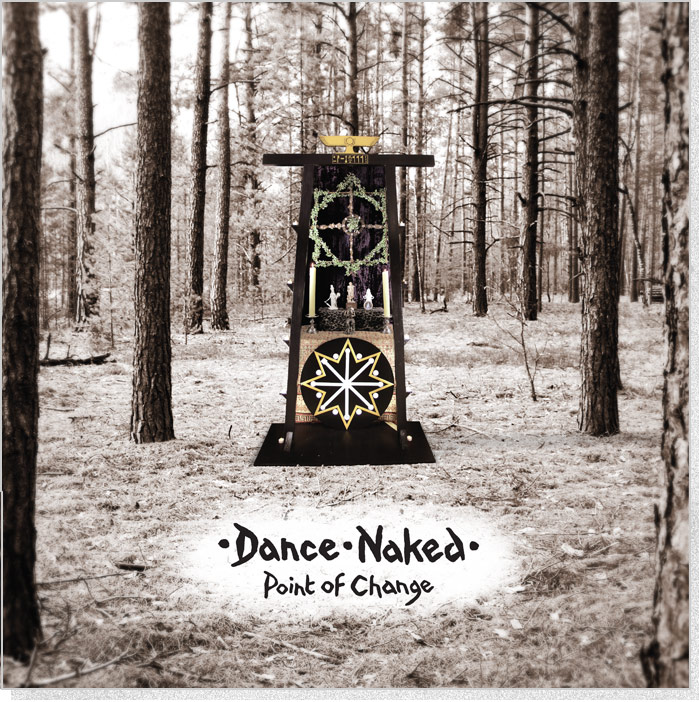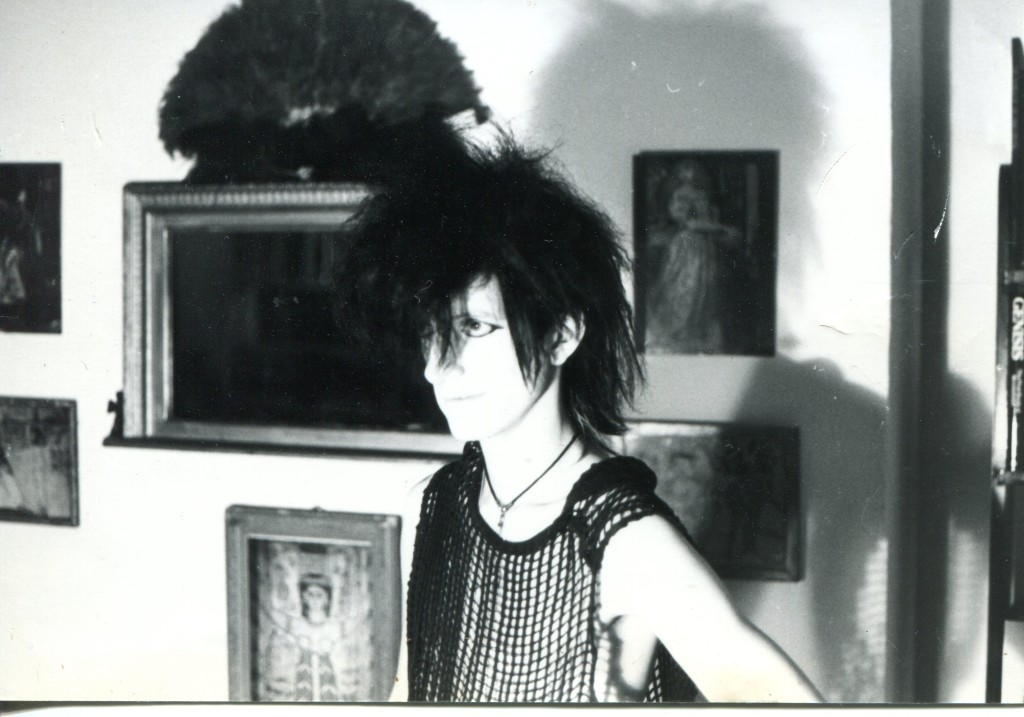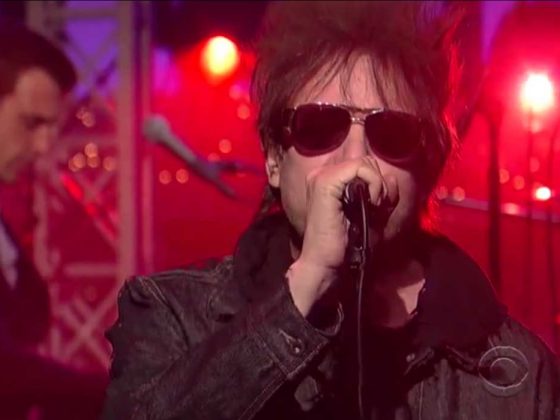Dance Naked, a project comprising Alan Rider, Kleo Kay, Roger Foyster, and Cary Meadows formed in 1986 from the remnants of Stress, and Garden of Delight. Their sound could be described as being reminiscent of Psychic TV, Coil, and Cindytalk on one end of the spectrum, and on the other similar to the Virgin Prunes and Princess Tinymeat, but such comparisons can be a disservice, and often misleading.
Ahead of the release of Dance Naked’s new record ‘Point of Change’ featuring re-mastered classic tracks, unreleased recordings, demos and live tracks on Aufnahame + Wiedergabe, I spoke with Dance’s Naked’s Alan Rider about the music, his successful fanzine/label, pschadelia, Goth, the occult, and liberating oneselves to enable free expression.
I understand you are the creator of the Adventures in Reality Fanzine, and later label. How did those projects come to be, and what came first, the music or the Fanzine?
“Adventures in Reality” the fanzine definitely came first. That would have been around 1980/1981. That’s a long time ago! The history of the fanzine is fairly well documented in an interview I did in 2011 with the ZineWeekly website which your readers can link to for the full story, but like most fanzine writers, my inspiration came out of the whole punk movement and the ethos of doing things yourself. I still subscribe to that way of thinking and technology has made it far more possible for anyone to be published. That’s really liberating, but in 1980, the only way to do that was to start a fanzine. So I did. The record/tape label came later, largely as a result of my interest in experimental music which I felt I should be more directly involved in (hence SPK, Test Department and other similar bands who featured on Adventures in Reality releases), and partly through my own involvement with bands like Attrition, Irsol and of course, Stress. It seemed like a natural progression from the fanzine and all of us were in a small but really creative community in Coventry where we were all very active in doing our own projects, bands and labels together.”
Before we go into Dance Naked, some people may know your work with your band Stress, which has seen several reissues through Dark Entries Records, and Other Voices. Has this sparked a resurgence in interest in Stress, and what can you tell us about the history of that band?
I don’t want to focus too much here on Stress as there are lots of other interviews you can read such as this one in Brutal Resonance webzine. It’s true though that there has been a renewed interest in Stress following the releases on Dark Entries and Other Voices and there may be more to come. Stress were a two piece electronic band formed by myself and another fanzine writer, Phil Clarke, in 1981. We did some really good stuff that has now become classic in its own way. Once we split I wanted to get something else together really quickly but also do something quite different from Stress, partly to prove that I could. Dance Naked was formed about a week after Stress split and was much more ‘live’ and with a big focus on the esoteric and the occult. It was also quite Gothic too. And that was when Goth was quite a new thing!
Really? It seems that the occult, shamanism, mysticism, and spirituality were a big part of many Gothic leaning bands at the time. Do you think this was something new, or perhaps the fact that the psychedelia of the 60’s was being re-expressed through the punk and gothic lens?
That’s a good point. Goth was really taking off at that time and I certainly wouldn’t claim that Dance Naked had anything other than a very small influence on that. You are right too that the occult in general has had a big influence on music since the 1960s. The Doors, Led Zeppelin, Black Sabbath, psychedelia, the list goes on. Where the Goth movement in the 1980s built on that was to take imagery from Denis Wheatley and Hammer Horror films and combine it with punk style from bands like The Damned, Siouxsie and the Banshees and The Cure to produce something new. I think Bauhaus were really influential in that, but other bands like The Birthday Party, Sex Gang Children, Virgin Prunes and others also played a huge part. It must have struck a chord because it caught on really quickly. It was also very glamorous with a very sexual undertone, but in a very androgynous way, with boys looking as pretty as the girls, which was challenging accepted gender stereotypes in the same way that Glam Rock, Bowie, Bolan etc did. It changed into Post Punk later of course, with a heavier, more electronic and aggressive feel.”

What were your influences in the creation of Dance Naked…information seems scarce on Kleo Kay and her band Garden of Delights…is there any background you could give on her, and what she brought into the project?
At the time I had recently met Kleo and we were in London, The other two members of Dance Naked were in Norwich, about 100
miles away. so we divided our time between the two places. We were very close to the Goth scene and bands like Bauhaus and Virgin Prunes and we used to hang out in punk/goth clubs like the Batcave a lot. Kleo has a massive knowledge of mythology and the occult – she can even read hieroglyphs – and that strongly influenced the lyrics. When I first met Kleo and we got together (and still are!) she was involved with a Norwich band, Garden of Delights that were very much in the mould of the Virgin Prunes. She managed them too and did pretty much all of their promo. They supported Stress at our last gig at a festival in London so naturally when we decided to form Dance Naked together we invited their singer, Roger, and their percussionist, Cary to join. With the two of us working on Dance Naked, combining her knowledge and background of esoteric and the magical side of life, and my background in electronic and experimental music, it worked out really well and Roger brought a lot in too as he also knows a lot about the occult, and is a very good singer and musician as you can hear on the LP.”
Was your writing process as a band more spontaneous or planned out? How did you go about writing songs? Was there a lot of experimentation and trial and error?
It wasn’t completely spontaneous, though we tried to keep an element of improvisation always. Generally, Kleo or Roger would write a set of lyrics or sometimes they would have something they had had ready for a while (from a dream for example) and that would form the basis of the track. The way of writing the music did change over time. At first we would all contribute individual bits, but gradually I started to write more and more of the music. ‘Bronze Contempt’ was written that way, with Kleo writing the lyrics, and me writing and playing the music. We would record the music first, often with my just getting down musical ideas and phrases, then adding the vocals, and all of us would then change it around, adding extra lines and phrases and adjusting the music until it sounded right. We only actually recorded demo versions of some songs, with just Roger singing and my playing bass just to get the basic structure down. They sound very stripped down hearing them now, but actually work really well like that and quite a few of those appear on the ‘Point of Change’ album without very much done to them at all, just re-mastered. Some tracks only remain as live recordings and weren’t even demo’d at the time, which I see now was a mistake. It was all a bit of a hit and miss process, and with basic equipment and only a 4 track to record onto it wasn’t all that easy, but seemed to work out ok for us at the time. Most of the album comprises of 4 track home demos but they sound great, which is really surprising.
Did The Batcave influence your music? Do you have any memories that stand out from attending that “legendary” club?
Of course it wasn’t legendary at the time, but has become so since, so to Kleo and myself it was just one of a number of places in London we went to. I can’t remember that much detail really as it’s easy to mix up different experiences looking back. I remember one odd instance of a girl dancing on the dance floor completely naked from the waist down but dressed very Gothy from the waist up. That was surreal! Above all I remember looking for all night cafes to get coffee and toast at after the club finished. They were usually in back streets and catered for night workers and prostitutes. So when the Batcave crowd were mixed in with that, it was a truly bizarre sight. That we accepted all this as being normal at the time is my strongest memory. Nothing really seemed surprising or shocking, however weird. In some ways I think things have gone back a step since and become a little more intolerant with everyone looking the same and being quite elitist about what music they listen to – although not everyone of course. Weird is definitely good!”
Do you think there are any parallels between the transition from Stress to Dance Naked, and Throbbing Gristle to Psychic TV?
That’s a very flattering analogy to draw, and there are similarities in the process of moving from a more electronic sound to a more organic one that has a more esoteric feel. Stress wasn’t Throbbing Gristle of course, and I would also draw a parallel with Coil too, who brilliantly made that transition. As I said earlier, there was a desire to do something that was a departure from Stress, but Kleo and Roger were massive influences on Dance Naked so it’s not a direct link between Stress and Dance Naked. The thing about Psychic TV I really liked wasn’t the music, which I wasn’t a huge fan of after that first album (Chris and Cosey were far better!), but the ideas and the ideology. We went along to a Temple Ov Psychic Youth all-nighter in Kings Cross (a notorious red light area of London) at the time and really liked the way they fused the imagery and ideas from a cross section of different cults and religions. I could see a lot of Aleister Crowley’s Thelema in there (which was also a big influence on Dance Naked’s lyrics) as well as Derek Jarman and Kenneth Anger.

What personally are your interests in the occult? I get the sense that there is a revival in interest in the occult in the music scene today. Did you, Roger, and Kleo have some way of connecting with spirituality through the music? What books and authors were you reading?
Kleo and Roger really have to take much of the credit for bringing that influence to bear in Dance Naked. Even the name ‘Dance Naked’, which means a free expression of your true self, casting aside all caution and false modesty to be who you are, had its roots in the belief in more than the literal. We live in a very literal and cynical scientific world. There is little magic left, so you need to re-create it yourself, or search it out. Everything is portrayed as scientific fact, yet science itself by its very nature has to be, in part, wrong. Otherwise there would be no progress or new discoveries. That means that to accept all views based on ‘fact’ as being true is risky, as at least some of these facts will be disproved in future. Knowing that means that there are many more possibilities than most will accept and being open to those doesn’t make you deluded but in fact quite the opposite. As for books and authors, I have already mentioned Crowley, but there were more of course. Kenneth Grant, Books on the Kabbalah, Dion Fortune, books on ancient religions and world mythology, all of them had an important place. To list more wouldn’t help though as everyone needs to find out what works for them by themselves.
I do agree that there is a renewed interest in the esoteric and the occult now as well, with acts like The Devil and The Universe and Black Egg carrying that on, which is really positive”
Dance Naked | Point of Change | out on aufnahme + wiedergabe August 22nd 2014

















 Or via:
Or via: